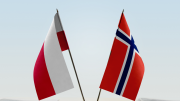The community of Polish immigrants living in Norway is sharing insights into their lives as part of Norway Today’s two-part series on the topic.
Intro: Statistics regarding immigrants in Norway
In 2020, 18.2% of Norway’s population is made up of immigrants and those born in Norway to immigrant parents. The largest immigrant community in the country are the Poles.
Around 790,500 immigrants live in this country, with just over 101,200 people from Poland. The next-largest immigrant groups are as follows: Lithuanians (40,600) Swedes (35,700), Syrians (32,000), and Somalians (28,500).
The main two reasons for immigration are labor and then family (beating out refuge and education by triple or more). 9.5% of immigrants in the labor force were registered as unemployed as of November 2020, while 5.3% of the total labor force in Norway was registered as unemployed in October 2020.
These are the most common jobs immigrants have in Norway: 25.1% are service and sales workers, 18% are professionals, 14.1% hold elementary occupations, and 12.6% are craft and trade-related workers. For comparison, these are the most common jobs of non-immigrants in Norway: 28.5% are professionals, 20.1% are service and sales workers, 17.2% are technicians and associate professionals, armed forces, and 10% are managers.
Finally, let’s summarize SSB’s findings on non-immigrant attitudes towards immigrants and immigration (between four options: “strongly agree”, “agree on the whole”, “disagree on the whole”, and “strongly disagree”). These are the highest percentage categories. 47% of Norwegians agree on the whole, and 31% strongly agree, that most immigrants make an important contribution to Norwegian working life. 38% agree on the whole, and 34% strongly agree, that most immigrants enrich the cultural life in Norway. 33% disagree on the whole, and 25% agree on the whole, that most immigrants are a cause of insecurity in society.
On the other hand, 46% voted “more difficult”, and 42% said “as today”, and 6% said “easier” when asked; “Attitudes towards refugees’ and asylum seekers’ access to residence permits in Norway. Compared to today, should it be easier, more difficult or remain the same as today?”.
Norway’s Polish community speaks on their successes
We spoke to Anna Najderek, leader of the non-profit Polish-Norwegian Association, to hear about the successes Polish immigrants found in Norway. We also spoke to Anna about their struggles, which you can read about here.
Anna was kind enough to include more members of the Polish community in sharing information, asking for inputs from the Facebook group for Polish people living in Norway.
Here’s what the community had to say about finding success in their new country.
What is the Polish community most proud of, in terms of things you’ve achieved in Norway?
“This is a comprehensive question that best can be explained by each individual for themselves.
“One of the answers I received from the Polish Facebook group is: We are proud of that we built in Norway. Without a doubt, Polish workers contribute much to building Norwegian infrastructure.
“This is significant, and a very good reason to be proud! Polish people are industrious, and we are good at working efficiently and being honest.
“In addition, in my opinion, every one of us has private reasons to be proud of something.
“I will also say a few words on what our Association is most proud of.
“First and foremost, the organizing of an annual Christmas meal for about 120 Poles in Bergen. For more than five weeks prior, every Sunday, the children were in rehearsal for a Christmas play, too.
“It was a big project where we received help from external persons who were not members of the Association, and who did not expect any reward.
“Additionally, together with good help from the Polish consul in Bergen, we have realized a dream from a Polish girl who is named Maja to come to Norway.
“We have also organized a number of stand-up performances with Polish artists. The biggest event was sold out with more than 600 tickets.”
What is the importance of your work with the Polish-Norwegian Association for Education and Integration in Bergen? Is this your primary job or do you have another as well?
“I should comment that during the last three years, I have not been as active as earlier in the Association. The reason is the challenges I have met in private and in my professional life.
“I treat work in the Association as a hobby. This is not a professional job; we work here pro-bono.
“Unfortunately, two years ago, I lost my job. In the meantime, I graduated in negotiations and mediation. Next year, I want to open my own company and help in solving conflicts in professional and private matters as well as create training programs in the field of negotiation and mediation.
“Earlier, I was actively organizing different events, be they for children or giving individual help to my fellow Poles who met challenges.
“I have never reflected on the importance of my contribution to charity. What was important for me was to do something together, to create possibilities, and meetings and dialogues.
“It was always people who wanted to help, and no one asked for remuneration for this service. Decisions are made in a community of friendship, and we work on our projects together.
“However, this is not always easy. As you may know, an association is a non-profit organization. We searched for sponsors to cover the costs related to the Christmas Ball for the children. Firms that we asked for help, closed the door on us.
“Then we got an idea to invite Polish artists to Norway to cover the costs related to the children’s activities. However, the costs became too high. Due to the risk of economic loss, we are not able to organize Polish cultural events anymore.
“To answer the question: What was important for me was to advise people that needed help from the Association. We have given Poles many possibilities to meet artists from Poland, we have invited Santa Claus to deliver Christmas gifts, and we’ve organized games and plays related to the Children’s Day.
“We have also given service to our fellow Poles in very difficult situations like children welfare or help with transportation of a coffin home to Poland.
“When people were satisfied, when the help was really needed, I would say that my work in the Association was a dream that was fulfilled.”
The Polish community enjoys special events together. Do Poles hang out together in Norway in general?
“Yes, we do. We have big events as well as smaller meetings.
“We have a Christmas Ball for the children, a special Children’s Day, performances by Polish artists, a number of meetings, celebrations of National Days and other traditional Polish events directed by the Polish embassy. There are also Polish organizations and Polish schools that are established in Norway.
“Recently, some Norwegian cities have organized the Great Orchestra of Christmas Charity, which has collected money for different medical charities for 28 years. This is a national collection in which Poles from all over the world participate.
“Poles in Norway genuinely find opportunities to come together whenever we can.”
So, the community continues to find ways of taking part in Polish traditions.
“Yes, in particular, we celebrate Christmas and Easter according to Polish traditions.
“For sure, I attempt to prepare Polish traditional dishes based on the foods available.
“We speak Polish at home. This is our tradition. As a consequence, my children are able to speak and write Polish fluently.”
With that – we decided to end this article of successes on a similarly positive note.
What are your favorite things about living in Norway?
“Undoubtedly it is nature, a beautiful landscape, and countless possibilities for outdoor activities.
“I believe that each of us can find a peaceful oasis to fall in love with. And for sure a less stressful lifestyle.
“One response I received from a man in the Polish group was I can have a husband and can live happily without unnecessary ideology.”
What’s your favorite Polish food and can you get it in Norway?
“One may prepare all Polish dishes from home with food from Norway. You can buy things you need in Norwegian shops or in international shops like Global Food.
“What I really miss, though, is the rich variety of Polish meat!”
What Norwegian foods do you like – and which do you not like?
“From traditional Norwegian dishes, I do not like fish balls or lutefisk (made from dried cod).
“For me, one of the most extreme dishes in the Norwegian kitchen is smalahove.
“One takes the head of a sheep and the leg of a sheep, dips it into salted water, and then hangs it to dry. Before serving it, one has to cook everything in water or water vapor and then serve it with potatoes.
“The general opinion is that it is the eyes that have the best taste. Smalahove is served for Easter.
“I have once tasted the tongue from the sheep… However, I will hold my opinion of the taste for myself.
“I love lamb ribs, meatballs and rice cream.”
What attraction do visitors to Norway have to see?
“The whole country is beautiful. It is difficult to choose one concrete place to visit.
“This summer, I went to Lofoten. This is a magnificent but difficult trip. In return, though, it has unforgettable views. One must travel to Lofoten to see it with one’s own eyes.
“This is a magic region in Norway. Sea, beach, and mountain meet – all in one place. Northern lights, the pulpits, fjords, glaciers…
“It is impossible to suggest one special place because I have fallen in love with the Norwegian landscape, and every day I discover something wonderful.”
Source: Norway Today






Be the first to comment on "Polish immigrants speak on finding success in Norway: “We are proud of what we have built”"